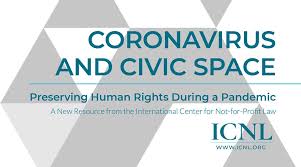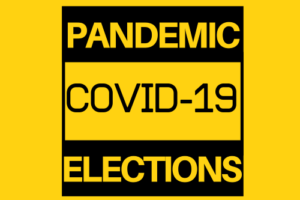Whereas democracies operate on consensus, autocrats react with sweeping measures threatening the rule of law. Who is better prepared for the COVID-19 crisis? Deutsche Welle asks:

International IDEA
Austrian democracy researcher Tamara Ehs is focusing on precisely these questions. Despite Beijing’s apparent success in stamping out the virus domestically, she says that: “anyone who praises the rigorous curfews in China when looking at the climax of the pandemic fails to recognize that it would not have been necessary (for a state operating) with transparency.”
In a new series – Coronavirus and Governments: What’s next for global democracy – VOA (above) looks at places where the coronavirus disease could be signaling the start of a greater malady – a regression to authoritarianism after centuries of progress toward a global liberal democracy.
International IDEA identifies a silver lining in the COVID-19 situation emerging across democracies: political leaders are making efforts to transcend the political divides and are cooperating in response to this pandemic.
 The #Libya conflict is taking a toll with +$4 billion losses due to an oil blockade, @PatriciaJKaram observes. Over 800,000 need humanitarian assistance. The course of #Covid19 depends on the silencing of guns. @IRIglobal is innovating programs to help Libyan partners mitigate the impact of the pandemic.
The #Libya conflict is taking a toll with +$4 billion losses due to an oil blockade, @PatriciaJKaram observes. Over 800,000 need humanitarian assistance. The course of #Covid19 depends on the silencing of guns. @IRIglobal is innovating programs to help Libyan partners mitigate the impact of the pandemic.

@NDITech
The Alliance Against Violence & Harassment in Jordan is demanding the government grant migrant workers legal residency during #COVID-19 as many permits will expire during lockdown, @SolidarityCntr reports. The Alliance also asks for safety gear for migrant workers.
In Elections during COVID-19: how to proceed with caution, International IDEA identifies key considerations to make informed decisions, based on an analysis of the current elections worldwide and previous comparative studies on polls in crisis situations.
#SocialDistancing can’t keep @NDI from supporting #democracy around the world! Check out this fun video on what NDI staff are still doing through the global #COVID19 #pandemic.
The NDI Parties Team @NDIparties highlights the latest @NDITech weekly roundup focusing on the #digital responses to #COVID19. Governments are responding with new tech solutions that implement innovative strategies for #SocialDistancing and more. Read more here.

International IDEA
COVID-DEM is meeting a global need by helping democracy analysts worldwide to track, compile, and share information on how state responses to the novel coronavirus (COVID-19) are impacting on democratic governance, DEM-DEC Director Dr Tom Gerald Daly writes, including:
Webinars
• Oslo Freedom Forum: COVIDCon – 13-14 April 2020
• Harvard: Big, If True Webinar: ‘Democracy During a Pandemic’ – 10 April 2020 1:00-2:00pm EDT
Databases & Resources
From the Inter-Parliamentary Union (IPU):
• ‘Parliaments in a Time of Pandemic’ resource.
• Technical Paper: ‘How to run a parliament during a pandemic: Q and A’ (1 April 2020) – in our ‘Policy Analysis’ section
 Blog Posts
Blog Posts
Check out the newly launched Verfassungsblog Symposium on ‘Covid-19 and States of Emergency’, coordinated by Dr Joelle Grogan and co-hosted by Democracy Reporting International (DRI)’s re:constitution project. 6 country reports have already been published (Hungary, Canada, New Zealand, Israel, Brazil, and Italy)
Policy Analysis
For analysis of the danger of emergency powers in the African context, see Eda Seyhan’s ‘Coronavirus: Beware the power grab’ (7 April 2020). Her new Twitter account, @COVIDStateWatch, monitors abuses worldwide.
Let COVID-DEM Know
Have you come across a relevant podcast, policy report, news article, webinar or database? Get in touch: you can use the online form or e-mail coviddem@gmail.com.
Power 3.0: Understanding Modern Authoritarian Influence, the blog of the National Endowment for Democracy’s International Forum, is exploring how savvy authoritarian governments survive and thrive in a globalized information age, and the ways that democracies are contending with this challenge.








